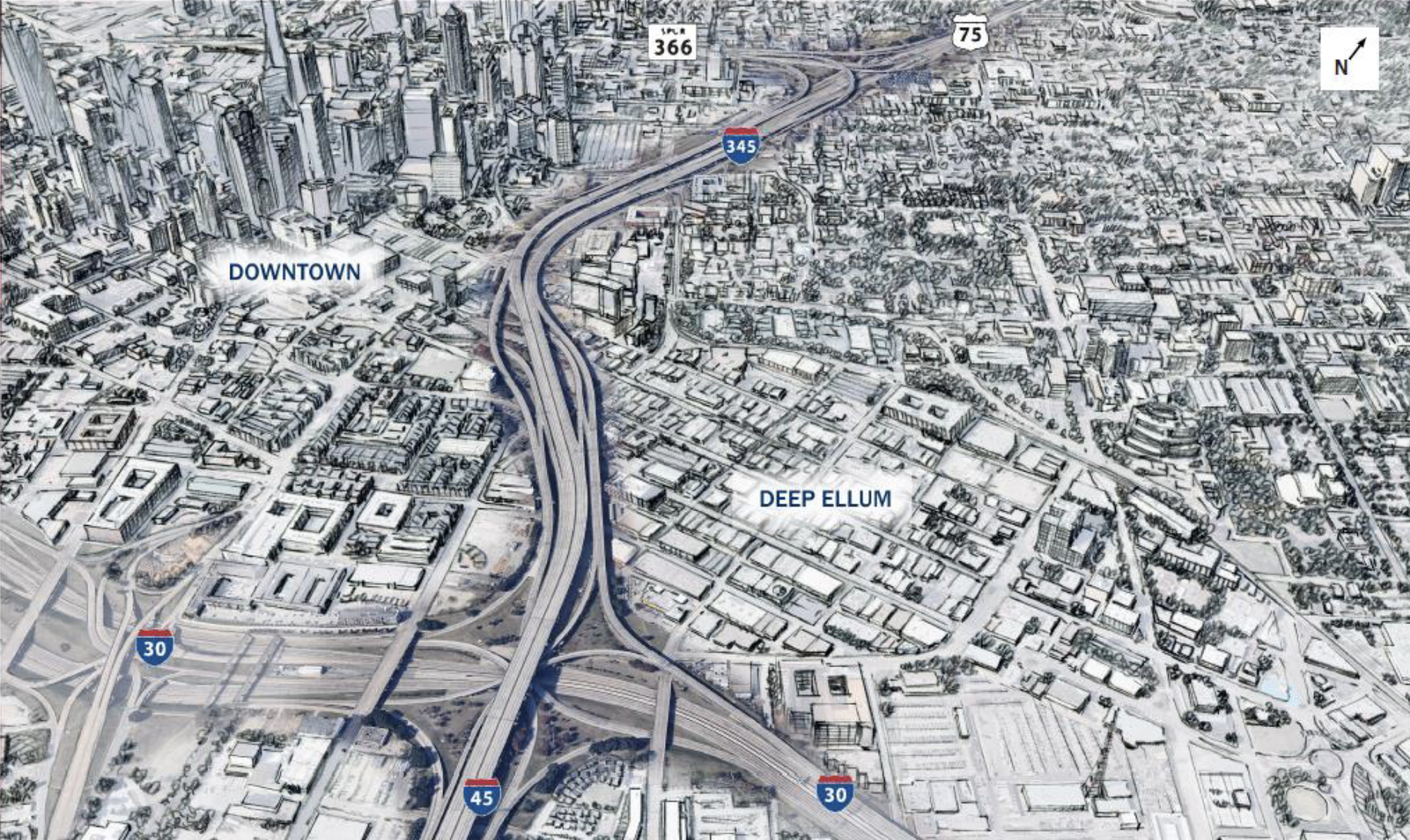On May 24, the Dallas City Council is set to give a thumbs up or down to the Texas Department of Transportation’s plan to remove and trench the 1.4-mile highway I-345 between downtown and Deep Ellum.
It will be the culmination of three weeks of events and years of planning. A panel discussion between city staff and stakeholders will be held this evening, May 8, at City Hall in the council chambers. (That runs from 6 p.m. to 7:30 p.m.) The item will be briefed before the Council’s Transportation and Infrastructure Committee on May 15, which will precede a City Council briefing on May 17 and a formal vote one week later.
The resolution is an important step for TxDOT. Its bosses who serve on the Texas Transportation Commission prioritize funding for projects that have support from the cities in which these projects are located. The state’s priority for I-345, which is presently elevated, would plunge 10 lanes into a 65-foot-deep trench. Existing streets would fly over the roadway, and the city would be able to pay for capped bridges upon which parks or buildings could be installed once design and engineering work is complete.
The other major option is removing the highway, replacing it with a boulevard, and reconstituting the surrounding street grid to accommodate traffic. But the state has declared removal a non-starter because of the congestion predicted by traffic models. Too, Gov. Greg Abbott has said that his priority is adding to highway capacity. That message means it is unlikely that the Texas Transportation Commission funds any projects that remove vehicle capacity from state-owned thoroughfares. The state already reneged on an agreement to hand over a highway to the city of San Antonio.
Until the governor’s edict changes, any radical revisioning of highways in Texas are unlikely to receive support from the state.
TxDOT presents its trench as a sort of compromise between the two ideas, dropping the highway below ground and reconnecting existing streets on either side of it similar to Central Expressway. But it will cost at least $1 billion, the state won’t fund the decking for development, and it will require years of construction and disruption.
There are still questions among some on the City Council and in the development world. The Dallas branch of the American Institute of Architects sent Mayor Eric Johnson a letter last month recommending “further review of what should be a generational infrastructure investment.”
It criticizes the width of the project: “the highway trench appears to be over 180 ft wide, more expansive than the width of a football field.” The 10 lanes of the highway, some of which feature multi-level lanes directing drivers to points north and south, will “[divide] the downtown and eastern neighborhoods even further,” their letter reads. It criticizes TxDOT’s plan to shoot elevated lanes over Ross Avenue, “obscuring the approach from east Dallas into the Arts District.”
Meanwhile, the AIA letter read, “the pedestrian experience across the highway trench is marginalized, uncomfortable, and treacherous.”
The letter uses the state’s digital visualization of the plan. There will be more engineering to come, and Ceason Clemens, TxDOT’s district engineer, has promised the City Council that each street over the highway will incorporate pedestrian infrastructure that meets the city’s requirements. It will still contain an enormous spread of concrete and vehicles near Dallas’ urban core.
These questions are hanging over the proceedings, and will likely be addressed during Monday’s panel. Some Council members have tried to force the matter prior to the resolution vote. On April 10, five Council members used a process known as a five-signature memo to create an agenda item that would direct the city manager to commission and fund an independent study into the plans for the highway. That study would explore things beyond moving cars, instead researching potential for economic development, housing, and other adjacent impacts if the highway were to be removed.
The five who signed that memo don’t necessarily support removal, but say they haven’t received enough information about the impact of the trenching plan to offer their support to the state.
That item must be briefed in committee before it is presented to council. And time is ticking. Catherine Cuellar, a city spokeswoman, says discussion of the memo will happen during the May 15 meeting of the Transportation and Infrastructure Committee. Part of that discussion “will likely be” whether to present the matter to the full Council for a vote.
The reason this matters: If a majority of the Council directs the city manager to commission an independent study, that will likely require the resolution vote to be delayed. If Council votes in favor of a resolution in support of the trenching, the study will be for naught.
If TxDOT receives its resolution in support, it will move forward with planning and requesting funding for the trenching project. City staff and the state are clearly ready for a final vote.
Monday’s public panel at City Hall will allow the city, state, and other stakeholders to “share details of and ask questions about” TxDOT’s work that informed its preference to put the highway below grade. It’s from 6 p.m. to 7:30 p.m. in the Council chambers at City Hall. Here’s the lineup, according to Cuellar:
City of Dallas
Assistant City Manager Dr. Robert Perez, who is over public works.
Transportation Director Gus Khankarli.
Planning & Urban Design Director Julia Ryan.
Economic Development Assistant Director Kevin Spath.
Housing & Neighborhood Revitalization Director David Noguera.
A yet-to-be-determined Park & Recreation staffer.
Partners
North Central Texas Council of Governments Transportation Director Michael Morris
DART Project Manager for Capital Planning Kay Shelton.
Deep Ellum Foundation Director Stephanie Hudiburg.
Urban planner and DART Board Member Patrick Kennedy.
Developer Jack Matthews, CEO of Matthews Southwest.
Developer Terrence Maiden, CEO of Russell Glen.
Author






